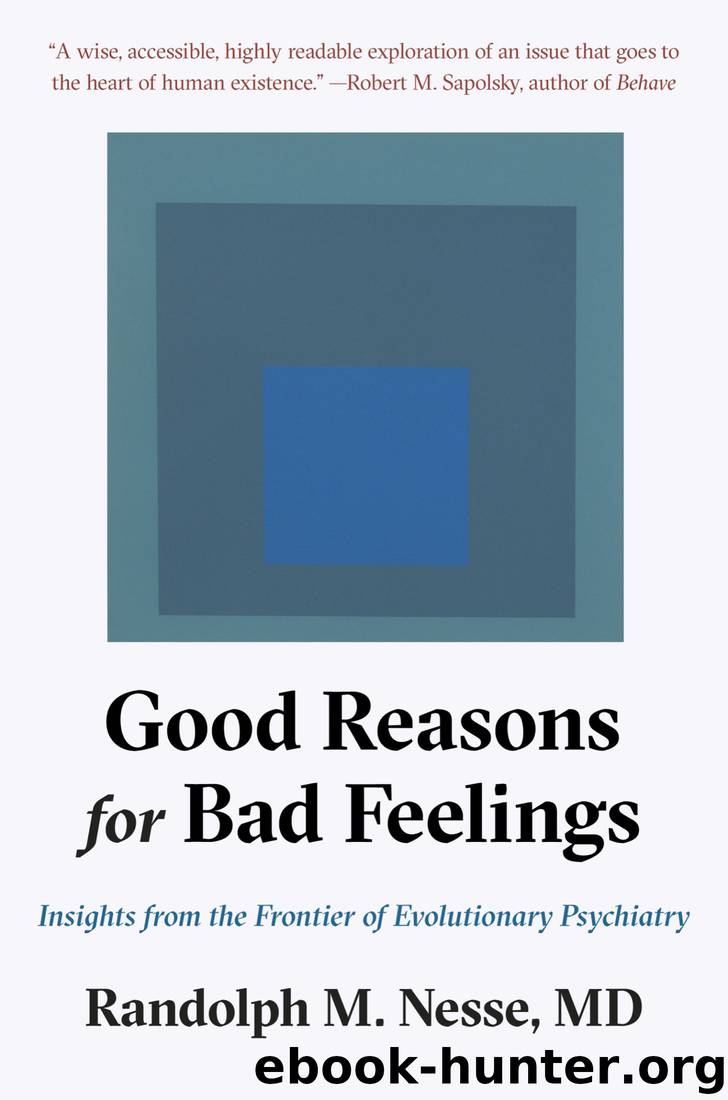Good Reasons for Bad Feelings: Insights From the Frontier of Evolutionary Psychiatry by Randolph M. Nesse

Author:Randolph M. Nesse
Language: eng
Format: epub
Tags: Psychology
Publisher: Dutton
Published: 2019-02-12T00:00:00+00:00
Social Anxiety and Self-Esteem
Social selection has big implications for mental disorders. When I began treating patients, many wanted help to make them less sensitive to what other people thought about them. It was the 1970s zeitgeist: I’m okay, you’re okay, let’s shed stifling social conventions and follow our bliss. Escaping conformity seemed like a laudable goal. I did my best to help patients achieve those aims, usually with only modest success.
As I came to understand how partner selection shapes relationships, I gradually recognized why social anxiety is overwhelmingly common. Natural selection shaped us to care enormously about what other people think about our resources, abilities, and character. This is what self-esteem is all about. We constantly monitor how much others value us. Low self-esteem is a signal to try harder to please others.114,115 However, trying harder to please others often conflicts with competing for status, creating plenty of conflicts that you hear about in psychotherapy.
Big life decisions about whom to marry, whom to work for, whom to hire, or whom to admit to a social group all involve careful assessments. We try to select honest, cooperative, generous people with plenty of resources who will work hard to benefit us and our group. The benefits that go to those chosen help explain the extraordinary potential cooperativeness of humans compared with any other species. This is what makes life bearable, and even good and wonderful, for many people.
However, some people make apparently heartfelt promises that are revealed to be mere manipulation the moment they get what they want. Some people hear about guilt or social anxiety and don’t know what people are talking about, any more than a color-blind person can grasp the experience of “green.” Such sociopaths aren’t bothered by such aversive emotions, and they have no compunctions about manipulating, cheating, lying, and taking advantage of others. Those who are crude about it tend to be excluded from social groups, sometimes by being locked away in prison. Subtler sociopaths use their skills to exploit victim after victim.
Such tendencies are highly heritable, but they persist. An article by the evolutionary psychologist Linda Mealey suggested that the genetic tendency to cheat would become more common in groups where most people were exploitable cooperators but would decrease in groups where cheaters are prevalent. The two forces would stabilize to maintain a certain ratio of cheaters to cooperators.116 I’ve never found this argument persuasive; full-fledged sociopaths are extruded from small societies or killed,117 and many have signs of minor brain damage.118 Mealey’s theory certainly is provocative, however. It becomes more compelling in mass society, where people can move between groups, leaving bad reputations behind.
Sociopaths are a danger not only because they exploit people but because they undermine trust. The experience of betrayal changes people. Betrayal by a parent can create distrust of everyone for a lifetime, distrust that makes deep relationships impossible. Several patients over the course of my career have told me spontaneously, at the end of many months of therapy, that they had never really trusted anyone before.
Download
This site does not store any files on its server. We only index and link to content provided by other sites. Please contact the content providers to delete copyright contents if any and email us, we'll remove relevant links or contents immediately.
Periodization Training for Sports by Tudor Bompa(8236)
Why We Sleep: Unlocking the Power of Sleep and Dreams by Matthew Walker(6681)
Paper Towns by Green John(5163)
The Immortal Life of Henrietta Lacks by Rebecca Skloot(4564)
The Sports Rules Book by Human Kinetics(4367)
Dynamic Alignment Through Imagery by Eric Franklin(4199)
ACSM's Complete Guide to Fitness & Health by ACSM(4040)
Kaplan MCAT Organic Chemistry Review: Created for MCAT 2015 (Kaplan Test Prep) by Kaplan(3993)
Introduction to Kinesiology by Shirl J. Hoffman(3753)
Livewired by David Eagleman(3752)
The Death of the Heart by Elizabeth Bowen(3596)
The River of Consciousness by Oliver Sacks(3587)
Alchemy and Alchemists by C. J. S. Thompson(3501)
Bad Pharma by Ben Goldacre(3411)
Descartes' Error by Antonio Damasio(3261)
The Emperor of All Maladies: A Biography of Cancer by Siddhartha Mukherjee(3132)
The Gene: An Intimate History by Siddhartha Mukherjee(3085)
The Fate of Rome: Climate, Disease, and the End of an Empire (The Princeton History of the Ancient World) by Kyle Harper(3045)
Kaplan MCAT Behavioral Sciences Review: Created for MCAT 2015 (Kaplan Test Prep) by Kaplan(2972)
